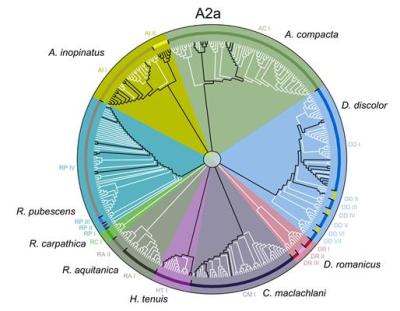Researchers of the Biodiversity and Climate Research Centre (BiK-F) and the SENCKENBERG Gesellschaft für Naturkunde have published a story in the “Nature Climate Change” journal, in which they say that over 80% of inner-species of biodiversity will be lost by the year 2080.
 "White branches show lost genetic lineages (no climatically suitable areas projected) in 2080 if global temperature increases by four degrees, Copyright: Miklos Bálint et al"
"White branches show lost genetic lineages (no climatically suitable areas projected) in 2080 if global temperature increases by four degrees, Copyright: Miklos Bálint et al"
This is the first global study to quantify biodiversity loss based on the variation and deviation in genetic diversity within a species. BiK-F and Senckenberg Gesellschaft für Naturkunde scientists examined how global warming has influenced genetic diversity within a specific species.
The study modeled the distribution of nine species of aquatic insects living in mountainous regions of Central and Northern Europe, which represent many other species living in similar regions. According to the model, the species will be pushed back to Scandinavia and the Alps by year 2080, if global warming happens at the rate predicted by the Intergovernmental Panel on Climate Change (IPCC). Of the nine species, by 2080, eight had chances of survival in case the temperature increase in Europe is only up to 2° and six species will survive if the increase in temperature is 4°. The overall projections say that there will be 84% loss in genetic variations by year 2080.
BiK-F’s Carsten Nowak says that as per their model, the chances of new species development are slim and added that since genetic variations help a species to adapt to new habitats and climates, the loss of these variations will bring down the possibility of long-term species survival. Steffen Pauls from BiK-F said that biodiversity loss due to global warming has been highly underestimated in studies so far, as they focused only on the number of species. However, there exists an opportunity to utilize genetic diversity to find more efficient methods of conservation under climate change conditions. The researchers emphasized the need for orienting conservation areas to regions having a suitable habitat and where a high level of genetic diversity within the species can be conserved in the long term.